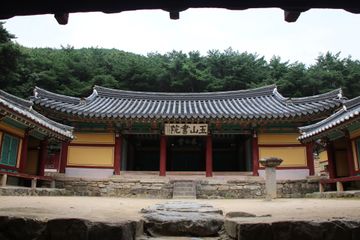"강학공간(경주 옥산서원)"의 두 판 사이의 차이
(새 문서: {{진행중}} {{문화유산정보 |사진=경주옥산서원강학공간.JPG |사진출처=[http://www.heritage.go.kr/heri/cul/culSelectDetail.do?ccbaCpno=1333701540000 경주 옥산...) |
잔글 (강혜원님이 경주 옥산서원 (강학공간) 문서를 넘겨주기를 만들지 않고 강학공간(경주 옥산서원) 문서로 이동했습니다) |
||
| (사용자 3명의 중간 판 6개는 보이지 않습니다) | |||
| 1번째 줄: | 1번째 줄: | ||
| − | {{ | + | {{개별안내판 |
| − | |||
|사진=경주옥산서원강학공간.JPG | |사진=경주옥산서원강학공간.JPG | ||
|사진출처=[http://www.heritage.go.kr/heri/cul/culSelectDetail.do?ccbaCpno=1333701540000 경주 옥산서원], 국가문화유산포털, 문화재청. | |사진출처=[http://www.heritage.go.kr/heri/cul/culSelectDetail.do?ccbaCpno=1333701540000 경주 옥산서원], 국가문화유산포털, 문화재청. | ||
| − | |대표명칭= | + | |대표명칭=강학공간 |
| − | |영문명칭= | + | |영문명칭=Lecture Area |
| − | |한자= | + | |한자=講學空間 |
| − | | | + | |종합안내판=경주 옥산서원 |
| − | |||
| − | |||
| − | |||
| − | |||
| − | |||
| − | |||
| − | |||
| − | |||
| − | |||
| − | |||
| − | |||
| − | |||
}} | }} | ||
| 30번째 줄: | 17번째 줄: | ||
강당 앞마당 좌우에는 유생들이 기거하던 동재인 민구재와 서재인 암수재가 마주보고 있는데, 유생들 간에도 위계가 있어 나이가 많은 유생들이 동재에 기거하였다. | 강당 앞마당 좌우에는 유생들이 기거하던 동재인 민구재와 서재인 암수재가 마주보고 있는데, 유생들 간에도 위계가 있어 나이가 많은 유생들이 동재에 기거하였다. | ||
| + | |||
---- | ---- | ||
*『구인록(求仁錄)』 : 조선 중기의 학자 이언적(李彦迪)이 인(仁)에 관한 학설을 종합적으로 고찰한 책. | *『구인록(求仁錄)』 : 조선 중기의 학자 이언적(李彦迪)이 인(仁)에 관한 학설을 종합적으로 고찰한 책. | ||
===영문=== | ===영문=== | ||
| + | '''Lecture Area''' | ||
| + | |||
| + | Confucian academies are composed of a lecture area and a ritual area. | ||
| + | |||
| + | In Oksanseowon Confucian Academy, the lecture area consists of a gate pavilion, two dormitories which face one another from across the courtyard, and a lecture hall at the rear of the courtyard. | ||
| + | |||
| + | The lecture hall, named Guindang, was the venue of the academy’s scholarly activities and was thus of great importance. The name, meaning “Hall of Seeking Benevolence,” comes from the title of a book by Yi Eon-jeok in which he comprehensively investigated the Confucian concept of benevolence (仁). The original lecture hall burnt down in 1838, and the current building was constructed the following year. | ||
| + | |||
| + | In front of the lecture hall are the dormitories. The dormitory to the right (east) was where the older or more advanced students stayed, while the dormitory to the left (west) was where the younger or more novice students stayed. | ||
| + | The gate pavilion, named Mubyeollu, was where students spent their leisure time. Its name means “Pavilion of Boundlessness” and comes from a poem by the Chinese philosopher Zhou Dunyi expressing that “the beauties of nature are boundless.” | ||
[[분류:문화유산해설문]] | [[분류:문화유산해설문]] | ||
[[분류:경주시 문화유산]] | [[분류:경주시 문화유산]] | ||
| + | [[분류:사적]] | ||
[[분류:경주 옥산서원]] | [[분류:경주 옥산서원]] | ||
| + | [[분류:서원]] | ||
[[분류:2020 영문집필]] | [[분류:2020 영문집필]] | ||
2023년 1월 18일 (수) 11:06 기준 최신판
| 강학공간 講學空間 Lecture Area |
|
 경주 옥산서원, 국가문화유산포털, 문화재청. |
|
해설문
국문
옥산서원은 강학공간과 제향공간으로 구분된다. 강학 영역은 학문을 연구하는 공간으로 무변루(無邊樓), 구인당(求仁堂), 민구재(敏求齋), 암수재(闇修齋) 등의 건물이 있다.
무변루는 유생들의 휴식 공간으로 `끝이 없는 누각' 이라는 뜻으로 현판은 한석봉의 글씨이다. 원래 납청루(納淸樓)라 하였으나, 노수신이 스승이 남긴 뜻에 맞지 않다하여 주돈이의 `풍월무변(風月無邊)'을 따서 무변루로 고쳤다.
구인당은 이언적의 『구인록(求仁錄)』*에서 따온 이름인데, 이 현판도 석봉이 썼다. 구인당은 헌종 4년(1838) 화재로 소실되었다가 이듬해 다시 지어졌다. 이곳은 강의와 토론이 열렸던 곳으로, 서원에서 가장 중심이 되는 건물이다. 마루 양쪽의 양진재(兩進齋)와 해립재(偕立齋)는 교수와 유사(有司)들이 기거하던 곳이다.
강당 앞마당 좌우에는 유생들이 기거하던 동재인 민구재와 서재인 암수재가 마주보고 있는데, 유생들 간에도 위계가 있어 나이가 많은 유생들이 동재에 기거하였다.
- 『구인록(求仁錄)』 : 조선 중기의 학자 이언적(李彦迪)이 인(仁)에 관한 학설을 종합적으로 고찰한 책.
영문
Lecture Area
Confucian academies are composed of a lecture area and a ritual area.
In Oksanseowon Confucian Academy, the lecture area consists of a gate pavilion, two dormitories which face one another from across the courtyard, and a lecture hall at the rear of the courtyard.
The lecture hall, named Guindang, was the venue of the academy’s scholarly activities and was thus of great importance. The name, meaning “Hall of Seeking Benevolence,” comes from the title of a book by Yi Eon-jeok in which he comprehensively investigated the Confucian concept of benevolence (仁). The original lecture hall burnt down in 1838, and the current building was constructed the following year.
In front of the lecture hall are the dormitories. The dormitory to the right (east) was where the older or more advanced students stayed, while the dormitory to the left (west) was where the younger or more novice students stayed.
The gate pavilion, named Mubyeollu, was where students spent their leisure time. Its name means “Pavilion of Boundlessness” and comes from a poem by the Chinese philosopher Zhou Dunyi expressing that “the beauties of nature are boundless.”